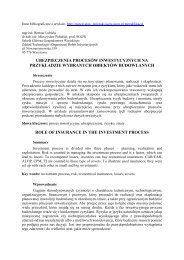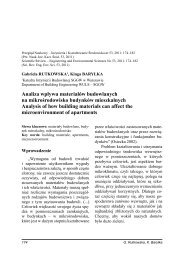ACTA SCIENTIARUM POLONORUM - SGGW
ACTA SCIENTIARUM POLONORUM - SGGW
ACTA SCIENTIARUM POLONORUM - SGGW
You also want an ePaper? Increase the reach of your titles
YUMPU automatically turns print PDFs into web optimized ePapers that Google loves.
Economic Policy in Central Eastern Europe: Unit Root Consequences 59consumption and investment, and the impact of particular policy changes. Keynesianismdid not accept neutrality of money hypothesis.Until the end of the 1960s, demand-management seemed to have fulfilled the ambitionsof the policy makers particularly on the employment goal. Fluctuations in outputwere fairly mild and in most “recessions” the growth in output merely slowed to an increasebelow the long term average. Thus in the UK, between 1950 and 1973, output onlyfell in one year. Nevertheless, there were still considerable fluctuations in the economyand during the 1970s the authorities seemed to be unable to overcome the cyclical instability.Some commentators observed that demand-management itself was destabilizingand that intervention removed the economy further from target than it would have beenif no action had been taken. For example, Artis [1972] examined the stability of GDP inthe UK around its trend. For the period 1958 to 1970, the dispersion of quarterly levels ofGDP from the time-trend was larger than the dispersion of estimated “policy – off” GDP(i.e. after deducting the effects of all policy changes). However, as Artis [1972] admittedthe course of target output to achieve a particular objective(s) may not always coincidewith trend GDP. Other evidence supported the viewpoint that discretionary policies didnot contribute towards stability included that presented by the OECD in 1969. For theUK, France and Italy the results of demand-management policies were actually destabilizing[OECD, Hensen 1969]. Such evidence can be refuted because the targets that theauthorities sought to achieve were not constant over time. Thus while there is evidencethat the annual targets for the GDP in the UK did not follow a steady trend, this is notsufficient to conclude that policy was destabilizing if the targets that the authorities choseto achieve changed over time. Nevertheless, the critique offered by commentators suchas Artis and Hensen suggested that if the economy was left to market forces, disturbanceswould prove temporary and ‘the invisible hand’ will deliver an economy that in the longrunwill exhibit stability around its prevailing rate of growth, whilst intervention wouldexacerbate instability in the economy.These practical considerations as to the efficacy of demand-management wereassociated with growing difficulties in the western economies in 1970s and the emergenceof new principles governing macro-economic behaviour. Under Keynesianism,policy was based on the requirement to manage demand because of the inherent instabilityof the economy. Left to its own devices, the economy would deviate from its longrunpath and only intervention would restore stable expansion. While policy evolvedover time, it remained interventionist in nature. From the mid 1970s the discretionarypolicy of varying instruments to achieve targets was replaced by the ‘rules’ approach.This opinion emphasized the idea that the economy was inherently stable. This reflectsthe greater importance of the long-run in determining crucial variables. For instance,where consumption depends on normal income (the permanent income hypothesis) asopposed to current disposable income (the Keynesian consumption function) one mightexpect that consumption and therefore aggregate demand to be slow to change followingany disturbance. Also if there is a stable relationship between the disposable income ofthe private sector as a whole (i.e. the personal and company sector) and its expenditurethis: “necessarily implies that no component of private expenditure exerts an independent(exogenous) net influence on the level of output or fluctuations in it” [Cripps et al.1974].Oeconomia 10 (1) 2011
















